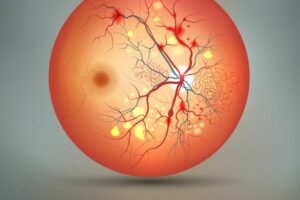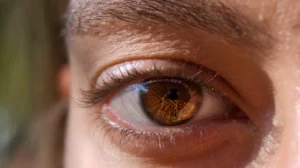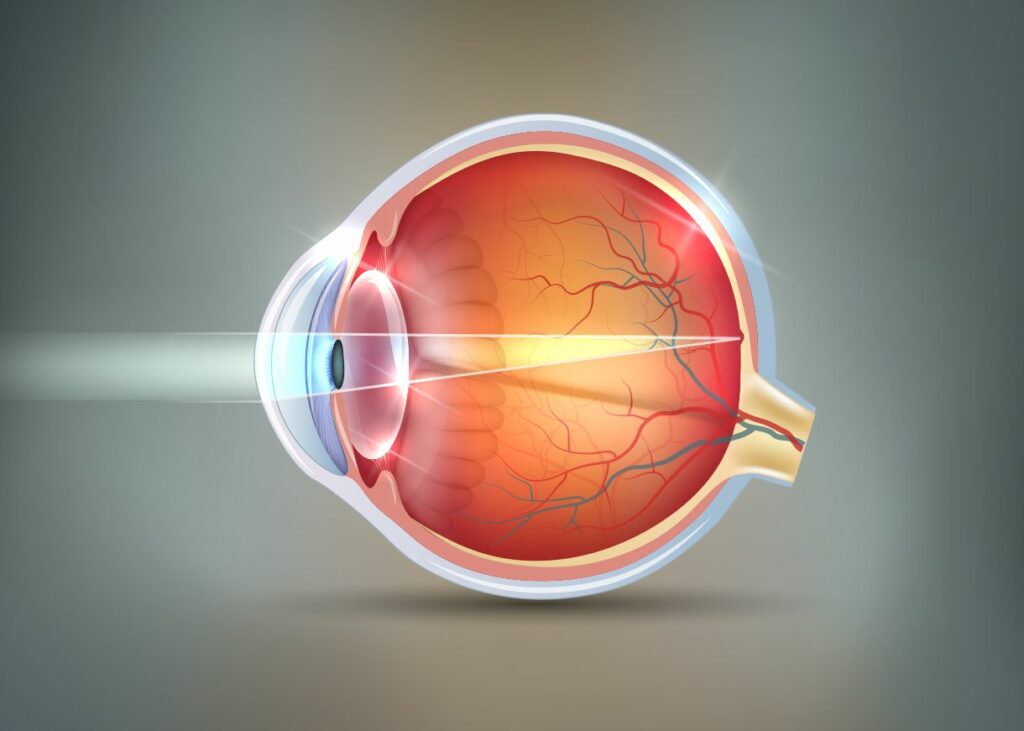Welcome to our comprehensive guide on retinopathy, a condition affecting the retina that can have significant implications for vision. Whether you are personally dealing with retinopathy or seeking information for a loved one, this blog aims to shed light on the causes, symptoms, and most importantly, the various treatment options available. We’ll explore both traditional and innovative treatment for retinopathy that can help preserve and improve your vision.
Contents
What Is Retinopathy?
 Retinopathy is a term encompassing a group of disorders that specifically target the retina, the light-sensitive tissue lining the back of the eye. One of the most prevalent forms is diabetic retinopathy, a complication of diabetes that occurs when prolonged high blood sugar levels damage the tiny blood vessels within the retina. This damage can lead to leakage, swelling, and the formation of abnormal blood vessels, impairing vision. It can potentially cause blindness if left untreated.
Retinopathy is a term encompassing a group of disorders that specifically target the retina, the light-sensitive tissue lining the back of the eye. One of the most prevalent forms is diabetic retinopathy, a complication of diabetes that occurs when prolonged high blood sugar levels damage the tiny blood vessels within the retina. This damage can lead to leakage, swelling, and the formation of abnormal blood vessels, impairing vision. It can potentially cause blindness if left untreated.
The progression of retinopathy can vary, with early stages often exhibiting no noticeable symptoms. As the condition advances, individuals may experience blurred vision, floaters, and difficulty seeing in low light. Timely diagnosis through regular eye examinations is crucial to initiate intervention before irreversible damage occurs. Treatment strategies aim to manage symptoms, slow progression, and, in some cases, restore or preserve vision.
What Is The Best Treatment For Retinopathy?
The most effective treatment for retinopathy often involves a multi-faceted approach tailored to the specific stage and severity of the condition. It’s crucial to note that managing diabetes itself is a fundamental aspect of retinopathy treatment, as controlling blood sugar levels can significantly slow the progression of the disease. However, when it comes to specific interventions for diabetic retinopathy, the following approaches are commonly employed:
Laser Photocoagulation
Laser photocoagulation is a widely used treatment for diabetic retinopathy, particularly in cases of proliferative diabetic retinopathy. A focused laser beam is applied to the retina during this procedure to create small burns or scars. These burns seal or destroy abnormal blood vessels, preventing them from leaking fluids into the retina. By targeting specific areas of the retina, laser photocoagulation aims to reduce swelling, preserve vision, and inhibit the progression of the disease. The procedure is often performed in an outpatient setting and can be instrumental in preventing further complications associated with advanced stages of diabetic retinopathy.
Intravitreal Injections
Intravitreal injections of anti-VEGF medications have become a cornerstone in the management of diabetic retinopathy, particularly in cases involving diabetic macular edema. Vascular endothelial growth factor (VEGF) is a protein that promotes the growth of abnormal blood vessels. Anti-VEGF medications, such as ranibizumab and aflibercept, are injected directly into the vitreous gel of the eye to inhibit the activity of VEGF, thereby reducing the growth of abnormal blood vessels and decreasing fluid leakage into the macula. This targeted approach has shown significant success in improving vision and slowing the progression of diabetic retinopathy-related complications.
Vitrectomy
Vitrectomy is a surgical procedure employed when there is substantial bleeding into the vitreous gel, causing severe vision impairment. During vitrectomy, the vitreous gel is removed and, if necessary, replaced with a clear solution. This surgical intervention is often reserved for advanced stages of diabetic retinopathy, where there is a significant amount of blood or scar tissue obstructing vision. Vitrectomy helps restore clarity to the visual field by eliminating the impediments within the eye. While it is an effective treatment, it is typically considered when other less invasive options have proven insufficient.
Regular Monitoring and Management
Beyond specific treatments, ongoing monitoring and management of diabetes are integral components of diabetic retinopathy care. Maintaining optimal blood sugar levels, controlling blood pressure, and managing cholesterol are crucial in preventing and slowing the progression of retinopathy. Regular eye examinations, conducted at least annually, enable healthcare professionals to detect any changes in the retina early on.
Collaboration with a multidisciplinary healthcare team, including ophthalmologists, endocrinologists, and primary care providers, ensures a holistic approach to diabetes care, addressing both the systemic and ocular aspects of the disease. By focusing on overall health and regular check-ups, individuals can proactively manage their diabetes and mitigate the risk of diabetic retinopathy-related complications.
The treatment choice depends on the specific characteristics of the retinopathy and the individual patient’s health status. Individuals with diabetes must undergo regular eye examinations to detect and address diabetic retinopathy at its earliest stages when intervention is most effective.
How Can I Improve My Retinopathy Vision?
 Improving vision in the context of retinopathy, particularly diabetic retinopathy, involves a combination of medical interventions, lifestyle modifications, and ongoing management. It’s important to note that the effectiveness of these strategies can vary depending on the stage and severity of retinopathy. Here are some general recommendations:
Improving vision in the context of retinopathy, particularly diabetic retinopathy, involves a combination of medical interventions, lifestyle modifications, and ongoing management. It’s important to note that the effectiveness of these strategies can vary depending on the stage and severity of retinopathy. Here are some general recommendations:
Control Blood Sugar Levels
Maintaining stable blood sugar levels is crucial for managing diabetic retinopathy. Consistently monitor and manage your blood glucose levels through medication, a balanced diet, and regular physical activity. Work closely with your healthcare team to develop a personalized plan that suits your individual needs.
Follow Your Treatment Plan
If your healthcare professional has prescribed treatments such as laser therapy, intravitreal injections, or other interventions, it’s essential to follow the recommended schedule and attend regular follow-up appointments. These treatments aim to address specific issues in the retina and can help stabilize or improve your vision.
Manage Blood Pressure and Cholesterol
High blood pressure and elevated cholesterol levels can exacerbate retinopathy. Keep these factors under control by adhering to a heart-healthy lifestyle, including a low-sodium diet, regular exercise, and medications as prescribed by your healthcare provider.
Adopt a Healthy Lifestyle
A healthy lifestyle contributes significantly to overall eye health. Consume a diet rich in fruits, vegetables, and omega-3 fatty acids, which are beneficial for eye health. Regular physical activity can also enhance circulation and support overall well-being.
Quit Smoking
Smoking is associated with an increased risk of developing diabetic retinopathy and can exacerbate its progression. Quitting smoking is a positive step toward improving your overall health and preserving your vision.
Protect Your Eyes
Wear sunglasses with UV protection to shield your eyes from harmful ultraviolet rays. Additionally, protect your eyes from injury by using safety glasses or goggles when engaging in activities with potential eye hazards.
Attend Vision Rehabilitation Services
If your vision is significantly affected, consider enrolling in vision rehabilitation services. These programs can help you learn adaptive techniques and use assistive devices to maximize your remaining vision and maintain independence.
Stay Informed and Communicate
Stay informed about your condition, attend educational sessions, and ask your healthcare team any questions you may have. Effective communication with your healthcare providers ensures that you receive the best possible care tailored to your specific needs.
It’s essential to note that individual responses to these strategies may vary, and the effectiveness of interventions can depend on the specific characteristics of your retinopathy. Always consult with your healthcare team for personalized advice and guidance based on your unique medical history and current health status.
What Foods Are Good For Retinopathy?
 Maintaining a healthy and balanced diet is crucial for managing retinopathy, particularly in the context of diabetic retinopathy. Here are some foods that may be beneficial for promoting eye health and supporting overall well-being:
Maintaining a healthy and balanced diet is crucial for managing retinopathy, particularly in the context of diabetic retinopathy. Here are some foods that may be beneficial for promoting eye health and supporting overall well-being:
Dark Leafy Greens
Foods like spinach, kale, and collard greens are rich in antioxidants such as lutein and zeaxanthin. These antioxidants may help protect the eyes from oxidative stress and support retinal health.
Fatty Fish
Cold-water fish like salmon, mackerel, and trout are excellent sources of omega-3 fatty acids. Omega-3s have been associated with reducing the risk of developing retinopathy and may contribute to overall eye health.
Colorful Fruits and Vegetables
Include a variety of colorful fruits and vegetables in your diet, such as carrots, bell peppers, berries, and citrus fruits. These foods provide essential vitamins, including vitamin C and vitamin A, which are important for maintaining eye health.
Whole Grains
Whole grains like quinoa, brown rice, and oats are good sources of nutrients such as zinc and vitamin E. These nutrients play a role in supporting the immune system and may contribute to eye health.
Nuts and Seeds
Almonds, walnuts, flaxseeds, and chia seeds are rich in vitamin E and omega-3 fatty acids, providing anti-inflammatory and antioxidant benefits that may be beneficial for the eyes.
Legumes
Beans, lentils, and chickpeas are good sources of protein, fiber, and various vitamins and minerals. They can contribute to overall health, including supporting blood sugar control.
Eggs
Eggs contain lutein and zeaxanthin, which are important antioxidants for eye health. They also provide high-quality protein and essential nutrients like vitamin D.
Lean Proteins
Choose lean protein sources such as poultry, tofu, and fish. Protein is important for maintaining muscle health, and including lean options can support overall well-being.
Hydrating Beverages
 Stay well-hydrated by drinking plenty of water throughout the day. Proper hydration is essential for overall health, including maintaining the health of your eyes.
Stay well-hydrated by drinking plenty of water throughout the day. Proper hydration is essential for overall health, including maintaining the health of your eyes.
It’s important to note that while these foods may contribute to a healthy diet, they should be part of a comprehensive approach to managing retinopathy, which includes regular monitoring, medical interventions as prescribed by healthcare professionals, and lifestyle modifications.
Conclusion
In conclusion, navigating the treatment for retinopathy, particularly in the context of diabetes, requires a holistic and proactive approach. Understanding the basics, from regular eye check-ups to the importance of managing diabetes, lays the foundation for preserving vision. Treatments such as laser therapy and injections, coupled with lifestyle adjustments like maintaining stable blood sugar levels and adopting a nutrient-rich diet, form a comprehensive strategy.
Remember, individual experiences may vary, and consulting with healthcare professionals for personalized guidance is essential. By staying informed, taking charge of your health, and embracing a positive outlook, you can empower yourself on the journey to a clearer vision and overall well-being.
Do you want to get rid of diabetes? Join our online diabetes treatment program and reverse Diabetes naturally through lifestyle changes such as a Personalized Diet plan, Exercise, Yoga, dieticians, and health coaches.

